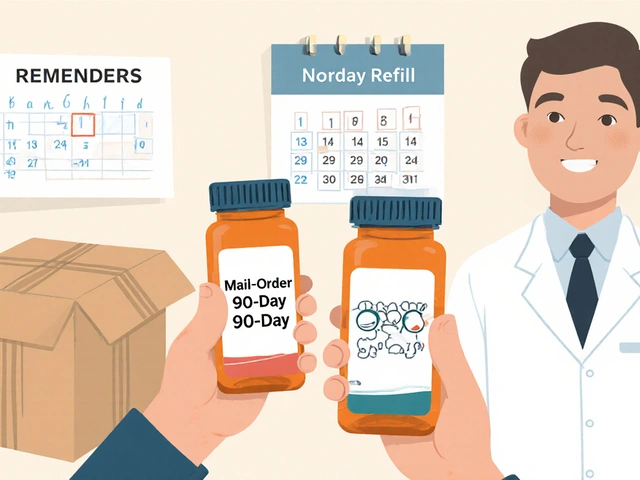Living with erectile dysfunction (ED) can feel isolating, but you don’t have to face it alone. erectile dysfunction support groups are community‑based spaces where men (and sometimes their partners) share experiences, coping strategies, and encouragement. In this guide we’ll unpack why these groups matter, the different formats available, and practical steps to find the right fit for you.
What Exactly Is an Erectile Dysfunction Support Group?
At its core, an Erectile Dysfunction Support Group is a gathering-online or offline-where individuals dealing with ED can talk openly about the physical, emotional, and relational challenges they face. Unlike a medical appointment, the focus is peer‑to‑peer, emphasizing shared stories, practical tips, and emotional validation.
Why Peer Support Makes a Difference
Research from the NHS shows that men who engage in peer support report lower anxiety levels and higher treatment adherence. Here’s why:
- Reduced Stigma: Hearing others voice the same worries normalizes your experience.
- Information Exchange: Members swap insights on medication timing, side‑effects, and lifestyle tweaks.
- Emotional Boost: A supportive community can improve confidence, which itself influences sexual performance.
- Accountability: Group members often set personal goals, keeping each other on track.
Types of Support Groups
Not every group looks the same. Choose the style that matches your comfort level and schedule.
| Format | Typical Setting | Facilitation | Key Benefits |
|---|---|---|---|
| In‑Person Community | Local health centres, charities, or hotels | Often led by a trained facilitator or therapist | Face‑to‑face connection, body language cues |
| Online Forum | Websites, dedicated apps, or private social groups | Peer‑moderated; sometimes clinician‑checked | 24/7 access, anonymity, geographic flexibility |
| Video‑Call Meet‑up | Zoom, Teams, or specialty telehealth platforms | Facilitated by a health professional or peer leader | Live interaction, visual cues, convenient from home |
| Professional‑Led Workshops | Hospitals or private clinics | Psychologists, urologists, or sexual health therapists | Evidence‑based techniques like Cognitive Behavioral Therapy |
How to Find a Group That Works for You
- Ask Your Doctor or Urologist: Many NHS clinics maintain referral lists for local support groups.
- Check National Charities: Organizations like the British Association of Sexual Healthcare publish directories of both in‑person and virtual meetings.
- Search Trusted Online Platforms: Websites such as HealthUnlocked or dedicated apps like TalkSpace for Men host moderated discussion boards.
- Explore Community Centres: Local libraries and community halls often host monthly health‑focused meet‑ups, sometimes free of charge.
- Ask Your Partner: Couples’ sessions or Relationship Counseling can introduce you to joint support options.
What to Expect at Your First Meeting
Walking into a new group can be nerve‑wracking. Here’s a realistic snapshot of a typical session:
- Introductions: A brief round‑table (or chat) where members share names and a quick reason they’re attending.
- Confidentiality Reminder: Facilitators stress that everything stays within the group.
- Topic Focus: Sessions might center on medication experiences, stress management, or relationship communication.
- Sharing Time: Individuals speak, others listen-no interruptions unless asked for clarification.
- Take‑aways: The group often ends with a summary of resources-handouts, reputable websites, or next‑step suggestions.
Most groups encourage you to attend a few sessions before deciding if the vibe feels right. That’s perfectly normal.

Tips to Get the Most Out of a Support Group
- Be Honest, but Guard Your Comfort: Share enough to get help, but you decide how much detail feels safe.
- Take Notes: Jotting down medication tips or lifestyle suggestions helps you apply them later.
- Set Personal Goals: Whether it’s trying a new exercise routine or speaking openly with your partner, concrete goals keep progress tangible.
- Stay Consistent: Regular attendance builds trust and amplifies the benefits.
- Give Back: Offering a piece of advice or a listening ear reinforces your own learning.
Potential Pitfalls and How to Avoid Them
While most groups are supportive, a few red flags can signal a poor fit:
- Lack of Moderation: Unchecked misinformation can spread. Verify any medical advice with your healthcare provider.
- Negative Vibes: If the atmosphere feels judgmental or overly pessimistic, look for another group.
- Commercial Pushes: Genuine support groups don’t pressure members to buy products. Report any unsolicited sales pitches.
Switching groups is okay-your wellbeing comes first.
Success Stories: Real‑World Impact
John, 52, from Manchester, says joining an NHS‑run in‑person group helped him discover Lifestyle Changes like regular walking and reduced alcohol, which improved his response to medication. Sarah, his partner, found the couple’s workshop invaluable for rebuilding intimacy.
Emma, 38, living in rural Wales, relied on an online forum for anonymity. She credits the community’s shared resources for helping her navigate prescription side‑effects without feeling isolated.
Quick Checklist: Is a Support Group Right for You?
- Do you feel comfortable discussing personal health topics?
- Are you looking for emotional encouragement as well as practical tips?
- Can you commit to attending regularly (even virtually) for a few weeks?
- Do you have a trusted healthcare professional to validate any medical advice you receive?
If you answered yes to most, a support group could be a valuable addition to your treatment plan.
Next Steps: Getting Started Today
- Make a short list of three options that fit your preferences (online, in‑person, professional‑led).
- Reach out via the contact email or phone number provided on their website-most groups welcome a quick introductory call.
- Prepare a few talking points: your main concern, any questions about medication, and what you hope to gain.
- Attend the first session with an open mind; remember it’s a safe space for learning and sharing.
Taking that first step can feel like a big leap, but the camaraderie you’ll find often turns the journey into a shared adventure rather than a solo battle.

How confidential are ED support groups?
All reputable groups-especially those run by the NHS or recognized charities-require members to sign a confidentiality agreement. Online forums often have privacy settings that let you use a pseudonym, but remember that moderators can see your posts.
Do I need a doctor’s referral to join?
No. While many NHS‑linked groups ask for a referral to track outcomes, most community‑run or online groups are open‑access. Having a referral can help you get a seat in limited‑capacity sessions, though.
Can my partner attend?
Absolutely. Many groups welcome couples because relationship dynamics are a big part of the ED experience. Some sessions are specifically designed for partners.
What if I feel uncomfortable sharing?
Start by listening. Most groups allow you to stay silent for the first few meetings. When you’re ready, share a small detail or just ask a question.
Are there free options?
Yes. NHS‑linked groups and most charity‑run meetings are free. Online forums typically have no charge, though some premium apps may offer additional features for a fee.




Deja Scott
October 20, 2025 AT 19:10Thanks for putting this together. The overview of different formats really helps anyone new to the scene to see what fits best for their schedule.
Demetri Huyler
October 28, 2025 AT 15:00Honestly, the whole “online forum” hype feels like a Band-Aid for a problem that needs real, face‑to‑face accountability. In my experience, meeting in a community centre forces you to own the issue rather than hide behind a screen. Plus, the NHS‑run groups have proper medical oversight which many private apps lack. If you’re serious, look for the ones that actually involve a licensed professional.
JessicaAnn Sutton
November 5, 2025 AT 11:49It is ethically imperative that participants verify any medical advice with their physician, as misinformation can cause more harm than good. The confidentiality clause protects personal dignity and encourages honest sharing. One should also be vigilant about groups that push commercial products without disclosure. By adhering to these principles, the support environment remains both safe and constructive.
barnabas jacob
November 13, 2025 AT 08:39Yo, the peer‑2‑peer model leverages psychosocial reinforcement loops that boost neuro‑vascular response over time. When you stack lifestyle tweaks with pharmaco‑therapy, you get synergistic outcomes. Just watch out for anecdotal “miracle cures” that aren’t evidence‑based – that’s a red flag. Keep the discourse evidence‑oriented and you’ll see measurable gains.
jessie cole
November 21, 2025 AT 05:29First and foremost, I commend anyone taking the step to explore support groups as part of their health journey. A structured environment offers a platform where shared experiences become a source of collective wisdom. When you attend a session, you will notice that each participant brings a unique perspective, which enriches the discussion. The facilitator’s role, often a trained therapist, ensures that conversations remain respectful and purposeful. Consistency in attendance builds trust, allowing members to be more open over time. Taking notes during meetings can help you retain practical tips, such as medication timing or lifestyle adjustments. Setting personal goals, like incorporating regular exercise or reducing alcohol intake, provides a tangible roadmap. Moreover, the accountability mechanism inherent in groups encourages adherence to these goals. As you progress, you may find that confidence in intimate moments improves, a benefit that is both psychological and physiological. It is also common for participants to exchange reputable resources, such as NHS guidelines or peer‑reviewed articles. These resources serve as a safeguard against misinformation. If a group appears overly commercial or dismissive of medical advice, it is perfectly acceptable to seek alternatives. Remember, the primary purpose of these gatherings is support, not sales. The emotional boost you receive from hearing others voice similar concerns cannot be overstated; it normalizes your experience. The emotional boost you receive from hearing others voice similar concerns cannot be overstated; it normalizes your experience. It is also common for participants to exchange reputable resources, such as NHS guidelines or peer‑reviewed articles. These resources serve as a safeguard against misinformation. If a group appears overly commercial or dismissive of medical advice, it is perfectly acceptable to seek alternatives. Remember, the primary purpose of these gatherings is support, not sales. The emotional boost you receive from hearing others voice similar concerns cannot be overstated; it normalizes your experience. Ultimately, embracing this communal approach can transform what might feel like a solitary struggle into a shared adventure toward better health.
Kirsten Youtsey
November 29, 2025 AT 02:19While the sentiment is noble, one must consider that many so‑called “NHS‑run” groups are subtly funded by pharmaceutical interests. The veneer of neutrality often masks hidden agendas, steering discussions toward medication adherence rather than holistic wellbeing. It is essential to scrutinize the funding sources before placing blind trust in any program.
Matthew Hall
December 6, 2025 AT 23:09I’m all in for this community vibe.
laura wood
December 14, 2025 AT 19:58It’s great to hear you found the overview useful; many feel overwhelmed by the options. Knowing there’s a mix of in‑person and virtual groups can really ease that initial anxiety.
Kate McKay
December 22, 2025 AT 16:48Exactly, staying grounded in medical accuracy protects everyone. I always suggest keeping a brief summary of the doctor’s recommendations handy during discussions, so you can quickly cross‑check any shared tips.
Israel Emory
December 30, 2025 AT 13:38Indeed; the psychosocial reinforcement loops you mentioned are well‑documented in the literature; however, it is crucial to differentiate between anecdotal successes and statistically significant outcomes; the latter provide a more reliable foundation for long‑term improvement.
Andrew Hernandez
January 7, 2026 AT 10:28online groups can work but nothing beats a real face to face chat when you need that personal connection
Natalie Morgan
January 15, 2026 AT 07:18Thanks for the thorough roadmap; I’ll take those suggestions to heart and start logging my progress after the next session.
Mahesh Upadhyay
January 23, 2026 AT 04:07Another hidden hand? Sure, but we still benefit from the structure they provide.
Rajesh Myadam
January 24, 2026 AT 18:10That enthusiasm is exactly what draws people in; a positive attitude can be contagious and help others feel more comfortable sharing.